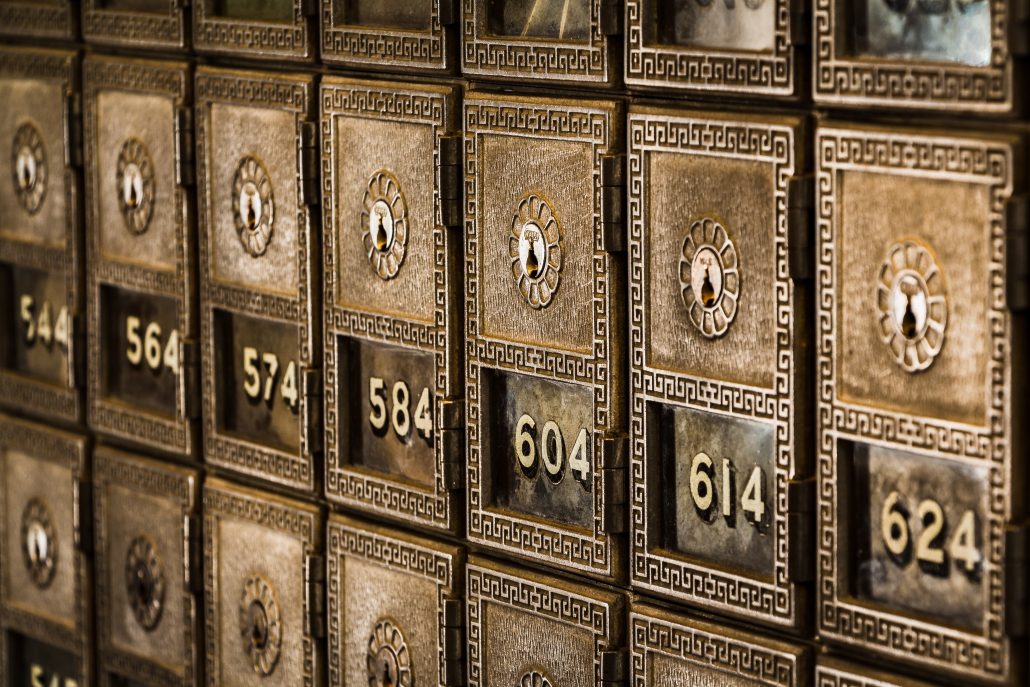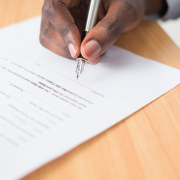Thanks for reading the #GoFisch blog! Now through February 14 I’m sharing how flowers, jewelry, or chocolate are not the only gifts that say, “I love you.” While not explicitly romantic, a personalized, quality estate plan speaks to that lifelong consideration and care be it for your significant other, your children, or even simply yourself.
Typical Valentine’s Day gifts usually come in the expected packaging—velvet or heart shaped-boxes topped with silky ribbons and complete with a red rose or a sappy card. But, an estate plan is not your typical Valentine’s present and therefore needs some special storage. You’re more than welcome to put a bow on the documents following the signing…finishing your estate plan is something worth celebrating! However, a gift bag won’t do for safely and securely protecting your estate plan.
I give my clients guidance on where to store their original estate plan documents because it should be both be kept private and safe, but should still be practical and accessible by those who need it such as your will’s executor or designated representative for financial matters. So, where specifically should your keep your original estate plan? There are a few different options.
In Your Home or Office

When you think accessibility, the places you spend the majority of your time, such as your home or office, are going to be obvious choices. Some of my clients who’ve chosen this option even invested in a water- and fire-proof safe. (Of course, if you get a safe, folks who need to access the estate plan, such as a spouse or child, obviously need access to the lock combo!) In any case, put the plan in a spot that’s likely to be protected from flooding or fire. For example, a dark, dank basement may not be the best place to keep your original estate plan documents. However, in your home office, in your desk’s top locked drawer (assuming others have a key), would be a much better spot.
Caution: No Treasure Hunts
Some people think “hiding” their will is a solution to any security concerns. This, however, inhibits accessibility! Sure, people may not be able to find your will while you’re living, but that also means your loved ones are unlikely to find it when they need it in the case that you suddenly pass away or are incapacitated and cannot communicate where it is. This is problematic for multiple reasons. First, your wishes cannot formally be known and therefore not fulfilled, and if the document cannot be found, the presumption is you either did not make a plan or you intended to revoke/destroy it. In the case of your death, the court will then act as if you died “intestate,” or without a will. The long probate process will ensue, and after some substantial court fees, your estate will pass to your heirs-at-law as determined by state law. (Almost everyone I’ve ever met would have their estate pass according to their terms and not some impersonal law.)
Safety Deposit Box
I know many folks who keep their important documents like birth certificates and social security cards in their safety deposit box. And when it comes to your original estate plan documents, your safety deposit box is a good option. Except, and this is hugely important, the safety deposit box must be readily accessible by executors, agents, and other fiduciaries. This requires making sure that your bank or credit union has the “right people on file.” Also, don’t assume that just because both you and your spouse have access to the safety deposit box, that is sufficient. What if there’s a joint accident or joint disaster and you’re both incapacitated? Sit down and talk with your bank or credit union to make absolutely certain those who need access to the safety deposit box will definitely have access in case of an emergency. Otherwise, a court order may be required before your financial institution will grant access, which equates to more bureaucratic hold-ups costing time, money, and even worse, adding additional stress for loved ones.

With Your Designated Representative
So far, we’ve been talking about your original estate plan documents (with “wet” signatures). An original is always better than a copy. But a copy is better than nothing. Consider giving a copy of your estate plan to the executor of your will or successor trustee of your revocable living trust, and other named fiduciaries.
The person you designate as your personal representative has the important job of settling your estate and they will need to be armed with your estate plan in order to reference your wishes and provide proof that they are authorized to take certain actions. This option makes a lot of sense considering this representative will have immediate cause to reference the paperwork following your death.

Up in the Cloud
I always recommend you retain a paper copy of your original estate plan, but there are many valid and secure options of also storing your key documents in the digital cloud. Like any financial, health, or other personal information accessible online, make certain you have a strong password and security. And, just like a paper version, at least your executor and other designated representatives will need to be able to access the plan when necessary. Whether that’s through an online beneficiary designation or by allocating the password to your executor or another trusted custodian, that’s up to you.
To recap: an estate plan can make a wonderful Valentine’s Day gift that shows love and commitment to your favorite people. And, since you spent time, effort, and money to create an estate plan that meets your goals, it’s essential to keep it in proper storage. Remember: if no one knows you created a plan or no one has access to it, it’s as if you never had one at all.
Before you can store your estate plan, you NEED an estate plan! The best place to get started is with my Estate Plan Questionnaire, or contact me.









